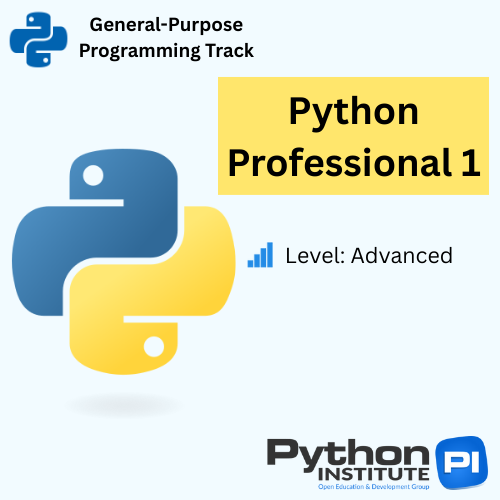🚀 Student DEAL: 50% OFF – Learn more, pay less, and level up your future today! 🚀

Python Professional 1
Dive deeper into advanced Python programming — learn to apply best practices and coding conventions, process diverse data formats, and leverage Object-Oriented Programming, GUI Programming, and Network Programming to build real-world applications. This advanced-level course prepares you for the PCPP1 – Certified Professional in Python Programming 1 certification and unlocks higher-level career opportunities.
🧠 What You’ll Learn
• Advanced Object-Oriented Programming concepts and design patterns
• Best practices and Python coding conventions (PEP 8 & PEP 257)
• Develop, refactor, and debug multi-module applications
• File processing and interaction with program environments
• GUI Programming: toolkits, blocks, and simple desktop apps
• Network Programming: REST clients, sockets, and connectivity
• Database programming, logging, and configuration management
• Architect Python-based solutions for complex, real-life problems
👥 Who Should Take This Course?
• Intermediate to advanced learners ready to expand beyond fundamentals
• Developers aiming for software, data, or network programming roles
• Professionals in IoT, networking, or cybersecurity seeking Python mastery
• Team leaders, PMs, and tech managers wanting deeper insight into development cycles
• Aspiring specialists pursuing AI/ML, testing, automation, or web development paths
🎯 What You’ll Achieve
• Confidently design, develop, and refactor multi-module Python applications
• Apply advanced OOP modeling to solve real-life problems
• Build GUI apps and networked solutions with Python
• Employ Python standards, best practices, and coding conventions effectively
• Process XML, CSV, and config files with database integration and logging
• Prepare for the PCPP1 certification and strengthen your career profile
• Expand your portfolio with advanced, practical projects
• Build a strong foundation for continuing with Python Professional 2
✅ Prerequisites
You should already know:
• Python data types, containers, functions, conditions, loops
• Procedural, structural, functional, and OOP programming basics
• Exceptions, PIP, modules, packages, generators, and closures
Recommended: Completion of Python Essentials 1 & 2 (or equivalent experience).

